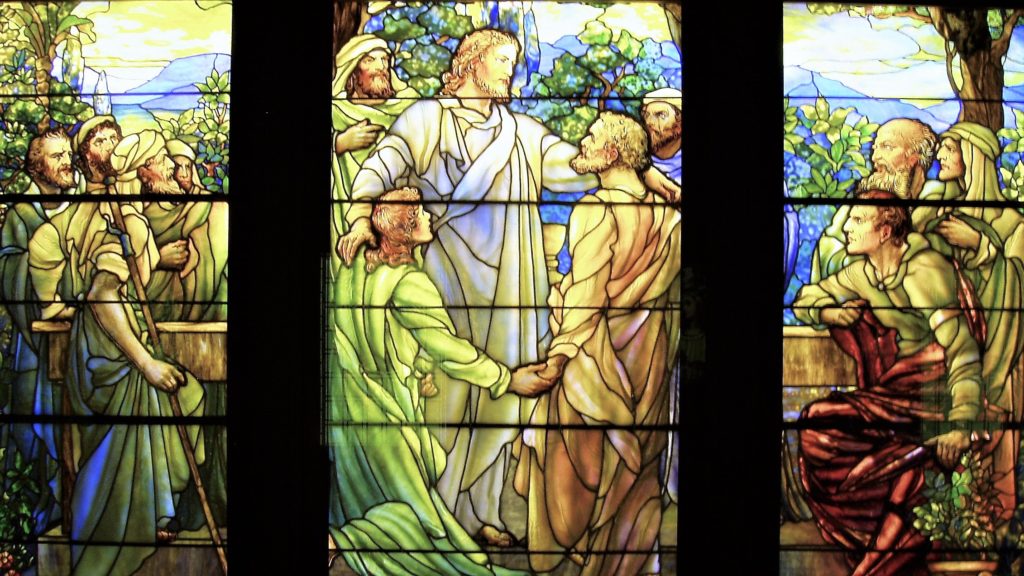SATURDAY 4TH WEEK IN ORDINARY TIME GOSPEL, COMMENTARY. HIS HEART WAS MOVED WITH PITY FOR THEM (Mk 6:30–34).

GOSPEL OF SATURDAY OF THE 4TH WEEK IN ORDINARY TIME
Mk 6:30-34
LIKE SHEEP WITHOUT A SHEPHERD
The Apostles gathered together with Jesus and reported all they had done and taught. He said to them, “Come away by yourselves to a deserted place and rest a while.” People were coming and going in great numbers, and they had no opportunity even to eat. So they went off in the boat by themselves to a deserted place. People saw them leaving and many came to know about it. They hastened there on foot from all the towns and arrived at the place before them.
When Jesus disembarked and saw the vast crowd, his heart was moved with pity for them, for they were like sheep without a shepherd; and he began to teach them many things.
COMMENTARY TO THE GOSPEL OF ST. MARK (WITH PERMISSION).
- vv. 30-31 We can see here the intensity of Jesus’ public ministry. Such was his dedication to souls that St Mark twice mentions that the disciples did not even have time to eat (cf. Mk 3:20). A Christian should be ready to sacrifice his time and even his rest in the service of the Gospel. This attitude of availability will lead us to change our plans whenever the good of souls so requires.
- But Jesus also teaches us here to have common sense and not to go to such extremes that we physically cannot cope: “The Lord makes his disciples rest, to show those in charge that people who work or preach cannot do so without breaks” (St Bede, In Marci Evangelium expositio, in loc.). “He who pledges himself to work for Christ should never have a free moment, because to rest is not to do nothing: it is to relax in activities which demand less effort” (St. Josemaria, The Way, 357).
- v. 34 Our Lord had planned a period of rest, for himself and his disciples, from the pressures of the apostolate (Mk 6:31-32). And he has to change his plans because so many people come, eager to hear him speak. Not only is he not annoyed with them: he feels compassion on seeing their spiritual need. “My people are destroyed for lack of knowledge” (Hos 4:6). They need instruction and our Lord wants to meet this need by preaching to them. “Jesus is moved by hunger and sorrow, but what moves him most is ignorance” (St. Josemaria, Christ is passing by, 109).
- At these times of real bodily weariness, Jesus is also redeeming mankind; and his weakness should help us to bear our own weakness and to co-redeem with him. How consoling it is to see our Lord exhausted! How close Jesus is to us at these times!
- As we carry out our duties, as we generously go about our professional work, as we unstintingly use up so much of our energy in apostolic initiatives and undertakings of service to others, it is natural that fatigue appears as an almost inseparable companion.
- Far from complaining about this inescapable reality, a reality that is common to all of us, we have to learn to rest close to God and to exercise ourselves constantly in that way of thinking. O Jesus! I rest in you (St. Josemaria, The Way, 732), we can often say inwardly as we seek our support in him.
- No one understands our tiredness better than Our Lord, because He himself was constantly in situations similar to our own. We must learn to recover our strength close to him. Come to me, he says to us, all you who labour and are heavy laden, and I will give you rest (Matt 11:28).
- We make our burden lighter when we unite our tiredness to that of Christ, offering it up for the redemption of souls. We will find it helps us if we live charity in a purposefully pleasant way towards those around us, even if at those particular times we find it a little more difficult to do so.
- And we must never forget that the use of leisure also is an activity that we must sanctify. Those periods of diversion should not be isolated inertial gaps in our lives, or be seen as the chance to allow ourselves some purely selfish compensation for our exertions. Love does not take holidays.
VIDEO COMMENTARY
TOPIC: DO YOU HAVE WORK-LIFE BALANCE?
In today’s gospel reading (Mark 6:30-34), the twelve apostles just came back from their mission (see yesterday’s gospel), excited at the preaching and healing they did. Jesus tells them to rest and reflect as He himself does. The success of their mission could have been a temptation for self-glorification among them and Jesus had to rein them in to make them understand what their goal was and Who they were doing this for.Let us reflect on the kind of balance in Jesus’ life and parallel ours with His.
Stay updated: subscribe by email for free TO OUR NEW WEBSITE www.catholicsstrivingforholiness.org (PUT YOUR EMAIL IN THE SUBSCRIBE WIDGET).
We are also in www.fb.com/Catholicsstrivingforholiness. Kindly help more people in their Christian life by liking our page and inviting your family, friends and relatives to do so as well. Thanks in advance and God bless you and your loved ones! Fr. Rolly Arjonillo


